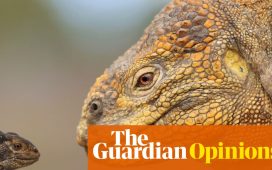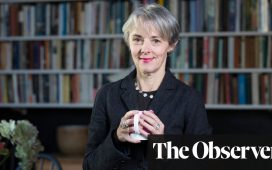Sure Start did change the lives of children, a new report by the Institute for Fiscal Studies (IFS) told us last week. It not only improved educational outcomes for children, particularly kids from deprived areas, but also reduced later need for education, health and care plans for those with special educational needs and disabilities (Send), and paid for itself. The confirmation that these centres for early years support were indeed a good thing was greeted by some as entirely surprising news that no one could have possibly predicted. If only we’d known!
Gordon Brown, the then-Labour chancellor who introduced Sure Start in 1998, helped retrieve my eyeballs from the bit of my skull I’d rolled them into, with his analysis: “These results tell us in detail what most parents already know. That if you provide a supportive environment to children in their early years and invest in their futures, the results will be life-transforming.”
Brown is surely being a bit generous with his use of “parents” here: isn’t it entirely obvious to anyone, everyone, that the first years of a child’s life are critical in determining all the years of their life that follow? Of course Sure Start was a good thing.
If you want proof alongside the assumptions of common sense I’ve made, studies have consistently shown the benefits of Sure Start (which was launched on the backs of proven initiatives in other countries) for years. There’s the one from 2008 showing a narrowing of the gap in development between deprived children and the rest of the population; the one in 2010 that found lower obesity and “better” behaviour in five-year-olds; the 2012 one showing its positive impact on mothers – particularly those in lone parent or workless households – parenting seven-year-olds; the one in 2019 detailing the millions it saved the NHS by making kids in deprived areas healthier.
As a child of Thatcher (bye-bye, milk), I didn’t get to experience the benefits of a Sure Start centre. But, as a child born on a council estate, in a decade of increasing national poverty, to a teenage mum and a father prone to violence, I did experience deprivation, physical abuse, and (at the hands of a stepdad) sexual abuse before the age of five.
Every time I’ve read about the difference those early years make, I’ve thought about myself as a baby, a toddler – my brain, emotions, very future, being hard-wired in the most brutal of circumstances; and the fallout of that start to life, the years spent in a storm of addiction, self-harm, fighting the fracturing of my brain.
But it didn’t have to be that way. Prevention and support for my mum, and for me – the exact people New Labour had in mind when it dreamed up Sure Start in response to poverty and inequalities in health and education – could have been part of a solution for our family. It could have changed everything. Or just enough.
Which makes the siege then laid to Sure Start by the 2010 Conservative government in the name of austerity (they call it “small state” ideology; I call it a war on the poorest in society), so painful to now consider. Funding for Sure Start has been cut by two-thirds (most brutally in the most deprived areas that need it the most), more than 1,340 centres have been closed, and others “integrated” into new “family hubs”. Those new hubs exist in only 75 authorities, and receive just 5% of the funding Sure Start did at its peak.
Yet, now, with this Conservative government on its last legs and a Labour opposition banging on the doors of Downing Street, why do I still feel so resigned to this “new” evidence being ignored rather than being used to better the lives of our children?
There is a space of ambient white noise that hums between what this pre-power Labour party says it wants – “reducing child poverty”, “expanding opportunity”, “the healthiest and happiest generation ever” – and what it has confirmed it will do.
Most outrageously, Labour has said it will keep the single-biggest driver of child poverty: the two-child benefits cap. And on Sure Start, the shadow education secretary, Bridget Phillipson, says: “The better future our children need will not come simply from winding back the clock.”
The party points to its “childcare focus” and the big idea for seemingly everything from poverty to the absence crisis: free breakfast clubs in primary schools. But with 4.3 million children growing up in poverty, a record-breaking 158,000 kids absent from school, reports of scurvy and rickets, vulnerable children being placed in illegal care homes, how exactly will our kids’ futures be saved by a bowl of cereal? Yes, childcare is vital, free breakfast is vital (especially with 900,000 kids in poverty in England alone missing out on free school meals), but they’re also basic components. They’re not the big idea.
They certainly don’t scream vision – and child development takes vision (or at least the vision to accept someone else’s). What those on the frontline of services appear to largely agree on is the need for a cross-government commitment to local infrastructure, an initiative that’s prevention-based, community-informed, that recognises the complex needs of families and that children’s health and cognitive and social development are intertwined. An initiative that, yes, targets the most desperate in these most desperate of times. Call that Sure Start, call that This Is Definitely Not Sure Start, I don’t care (as the experts have outlined, it wasn’t perfect). Just listen.
As we crawl towards the election, I’m oddly drawn towards Churchill’s famous “no finer investment for any community than putting milk into babies” speech. Not for those words, but the more radical ones on his imagined future for postwar England. His rallying cry for “well-thought-out plans for helping parents to contribute this life-spring to the community” for “the care of the young and the establishment of sound hygienic conditions of motherhood”. Ring any bells?
It was a choice then, 81 years ago, and today, in these trying times, it’s a choice still. A political choice, and a human one. Does today’s Labour party believe that every childhood matters? That a child’s right to thrive, right to life, is respected? Do we as a country? That’s the question and the choice it, and we, face. How we answer will define us all, but it will only truly be felt by the babies and toddlers looking to us to answer, and to speak, for them.



